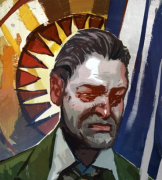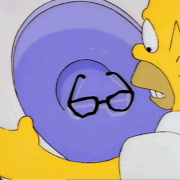|
https://docs.google.com/document/d/e/2PACX-1vTqdJYzQLsQ1UCw4kg-u52FfAYHPeSTF9tH8hWkH9dvYiWtYaSe9eSglSwz884nQPln8xR3iMuOqk-J/pub is the monk guide I've generally referenced. It's hard to go wrong if you take: stance with damage, stunning fist, stand still, and train athletics. You can punch trip and grapple people, and if they try and stand up or move away, you get free attacks on them. The monk ki spells other than ki strike are pretty much poop, and if you want to use weapons, uhhh, pick a different class that's actually good at it?
|
|
|
|

|
| # ? May 31, 2024 06:12 |
|
Arivia posted:the best place to look for this info is paizo's web store - if it's in stock it should also be in stock at other retailers. if it's not in stock, paizo staff will likely discuss when they've ordered the next printing for in the comments to the page. I have Aaron Shanks' Post History bookmarked on my phone because he answers a lot of these questions, case in point he posted the other day that the Pocket Edition will not be reprinted due to the revised core set coming out.
|
|
|
|
Epi Lepi posted:I have Aaron Shanks' Post History bookmarked on my phone because he answers a lot of these questions, case in point he posted the other day that the Pocket Edition will not be reprinted due to the revised core set coming out. That’s exactly who I was thinking of, thanks.
|
|
|
|
Big Mouth Billy Basshole posted:Is there a good resource I could point the monk towards? He didn't use flurry of blows, ki spells or any stances. I don't know how he built his character, but I'm sure he should have used some of those. The Ranger or Gunslinger class, crossbows are bad without class/feat support and monk is bringing nothing to it. If he really wants to be a ranged weapon monk, point him towards using a bow with Monastic Archer Stance
|
|
|
|
Gwaihir posted:https://docs.google.com/document/d/e/2PACX-1vTqdJYzQLsQ1UCw4kg-u52FfAYHPeSTF9tH8hWkH9dvYiWtYaSe9eSglSwz884nQPln8xR3iMuOqk-J/pub is the monk guide I've generally referenced. After two campaigns my group doesn't really agree with monk guides that say KI strikes suck and stunning blows is S tier. With fights usually three rounds long getting bonus accuracy and damage on one of them is really good. It can be the difference between hitting or critting and force vs ghosts or triggering a vulnerability can be a huge damage increase. Burst damage is also just plain good for tiping the balance of a fight so it stops being a threat. Stunning blows has the incapacitate trait and Paizo APs love throwing higher level monsters at you. It has only been relevant once or twice over dozens of sessions.
|
|
|
|
We had 2 monks go 1-20 and I think we've hit a stunning blow a handful of times, and 0 of them felt impactful. They're really good for making your DM roll fortitude saves for no effect on every monk turn. Did see some decent Ki strikes though. But crossbows are terrible, especially on a monk.
|
|
|
|
Monks usually have a hand free for maneuvers and battle medicine, have high mobility, and fury of blows. You should be playing something that takes advantage of at least two of these strengths. Ranged is generally less damage than melee and you are playing the fastest class in the game. When you can run to a flanking position, flurry, and run back to safety, you don't want a crossbow. Thrown weapons or monastic archer is a perfectly fine backup option but shouldn't be your primary focus. A monastic archer who mixes it up in melee grabbing or tripping foes, making opportunity attacks, and finishing off hard to reach or vulnerable enemies with arrows while providing support to other frontliners can be effective but is relatively high complexity. I'd recommend focusing on melee for at least the first few sessions. It is a lot easier to make enemies flat-footed and helps spread incoming damage out among multiple PCs.
|
|
|
|
Having a person go yeah you’re good at this set of things, here’s how to do that and here is what you roll and here is why that thing is good is a lot more helpful than any guide, especially for new players who likely don’t have any frame of reference for guides. Just walk them through stuff or deputize another player to do that and also someone should explain that the pf2 devs have a 15 year long blood vendetta against crossbows
|
|
|
|
sugar free jazz posted:Having a person go yeah you’re good at this set of things, here’s how to do that and here is what you roll and here is why that thing is good is a lot more helpful than any guide, especially for new players who likely don’t have any frame of reference for guides. Just walk them through stuff or deputize another player to do that Most pf2 guides I've seen are downright bad. Pages upon pages of opinions on different ancestries that don't really matter in practice and often fundamental misunderstanding how the math works on bounded d20 rolls. I used to occasionally look at them for a second opinion on weirder stuff but searching the pathfinder discord tends to give better information. As for crossbows, treasure vault finally released a decent martial crossbow but it only works with a build designed around using it. Sniper gunslinger is really good at getting critical hits once you've gotten used to the stealth system. It turns out the +4 bonus from superior cover makes hiding a lot more reliable than feinting most of the time. New players probably shouldn't play a gunslinger though. If your party is having trouble with AC 21 they don't know how to use teamwork well enough for a gunslinger to trigger fatal often enough to not be a liability.
|
|
|
|
Let me re-phrase, ki strike, the spell, is great, I love it. The other ki stuff, wholeness of body or w/e the bad heal is, etc, not so great. Stunning fist is great in any mook fight, but it's totally fine and good to take crushing grab or brawler focus too imo. I grapple pretty much everything I get in to melee with on my monk because I took wrestler dedication, so it's nice and reliable.
|
|
|
|
To counterpoint ki blast is good because you can Kamehameha.
|
|
|
|
Gwaihir posted:Stunning fist is great in any mook fight I haven't spent the time swimming in the oceans of guides and technical detail because my attention is as firm as a greased-up snake on a waterslide, but I think this hits on what a lot of guides likely try and do which is "optimize for all cases" or at least "optimize for majority cases" and that only goes so far when a good Adventure has a mix-up of scenarios that let different abilities work. This is also where I think a good GM knows when and how to reduce/increase HP, even modify AC down if necessary, and use dramatic punctuation to find a narratively satisfying exit point if neither of those work for an encounter. Some players do want to play like Skyrim and just know that every single motherfucker on the combat field died brutally at their hand, but just as many simply want to feel effective even if they're not very technically speaking "effective."
|
|
|
|
Ask your players. Mine would hate it if I was loving around with stats to create a “good”encounter for them.
|
|
|
|
Wholeness of Body has pretty good odds of clearing poison, which can be extremely lethal and basically makes you immune to disease. My players killed a giant scorpion in less than two rounds and then spent the next four doing everything in their power preventing half of them dying to venom. It was extremely close, with each being a failed roll away from death. Disease can be a huge problem depending on the campaign. Once I had an entire party inflicted with ghoul fever and we had to start a new campaign. I've had sorcerers dealing with fly pox for four levels before they were able to accumulate enough saves to recover. My current AV party has had to hire an NPC to remove disease on three or four occasions, and they only resort to that when another failure will get someone killed. This is with them taking Robust Recovery, an extremely good anti-poison and disease feat that I highly recommend. Edit: For healing Wholeness is only two points behind Lay on Hands at level 5. At level 7 and beyond it is just as good or better. It also relieves time pressure for out of combat healing. The party can basically ignore the monk while healing everyone else up with treat injury. KPC_Mammon fucked around with this message at 01:55 on May 26, 2023 |
|
|
|
mind the walrus posted:I haven't spent the time swimming in the oceans of guides and technical detail because my attention is as firm as a greased-up snake on a waterslide, but I think this hits on what a lot of guides likely try and do which is "optimize for all cases" or at least "optimize for majority cases" and that only goes so far when a good Adventure has a mix-up of scenarios that let different abilities work. Yeah fudging encounters being the mark of a good GM is definitely a take
|
|
|
|
Arivia posted:Ask your players. Mine would hate it if I was loving around with stats to create a “good”encounter for them. sugar free jazz posted:Yeah fudging encounters being the mark of a good GM is definitely a take
|
|
|
|
I mean, it sounds bad when you just say it that blatantly, but in practice it isn't that far from using worse tactics to give your players an easier time. You're effectively just deciding to have the enemy surrender at 50 HP instead of dying at 0, and if you decide your players are getting too salty about how high the AC is in this fight and do something like have the enemy general tear his helmet off to show that his AC is being lowered it isn't that different from having him blunder into an easy flanking position. It's definitely something that you should only do if you think your group would be alright with it, but I wouldn't call it abhorrent GM practices or anything.
|
|
|
|
mind the walrus posted:
|
|
|
|
mind the walrus posted:
lol
|
|
|
|
It is a point of pride that encounters generally work in pathfinder 2e if you follow the encounter guidelines. A lot of other systems fall apart unless the gm constantly keeps their hand on the scale but that isn't necessary here. There are some really nice advantages to letting game balance and dice decide the party's fate. Everyone knows that their actions and decisions matter. The stakes are real. As soon as players realize they can't lose because the gm is constantly fudging, you lose any sense of suspense or stakes. If you fail it is because the gm wanted you to fail and not a single victory is yours to celebrate since you know it was decided by the gm before you sat down to play.
|
|
|
|
KPC_Mammon posted:There are some really nice advantages to letting game balance and dice decide the party's fate. Everyone knows that their actions and decisions matter. The stakes are real. As soon as players realize they can't lose because the gm is constantly fudging, you lose any sense of suspense or stakes. If you fail it is because the gm wanted you to fail and not a single victory is yours to celebrate since you know it was decided by the gm before you sat down to play. I'm not sure that this is entirely true. In many movies, I know what the end is going to look like. The good guys won, basically. But at the start of the movie I don't know how, and I don't know at what cost. Both of these uncertainties can provide perfectly satisfying suspense and stakes, and can make the character's decisions in the movie matter. Of course, there are movies where the outcome is much less certain at the outset, and it's perfectly reasonable to prefer one sort of movie to another. It's unclear to me why ttrpgs are different.
|
|
|
|
pork never goes bad posted:I'm not sure that this is entirely true. In many movies, I know what the end is going to look like. The good guys won, basically. But at the start of the movie I don't know how, and I don't know at what cost. Both of these uncertainties can provide perfectly satisfying suspense and stakes, and can make the character's decisions in the movie matter. Of course, there are movies where the outcome is much less certain at the outset, and it's perfectly reasonable to prefer one sort of movie to another. I have the same problem with formulaic movies where the ending is basically assumed because the stakes are less in my mind. They can be kind of fun, but they usually feel like they are less memorable to me. Thats not to say that they are bad, just not what I prefer. I don't think TTRPG's are really that different in this regard and it's really just a preference thing. In my mind the difference is a movie is a few hours of your time while a TTRPG campaign can take years and knowing I'm going to win the whole time makes it hard for me to stay invested and stay serious at the table. It feels like I'm just helping tell a story and not playing a game anymore. Not really saying that this is universally bad, or that it can't be done well, just not what I prefer to do.
|
|
|
|
pork never goes bad posted:I'm not sure that this is entirely true. In many movies, I know what the end is going to look like. The good guys won, basically. But at the start of the movie I don't know how, and I don't know at what cost. Both of these uncertainties can provide perfectly satisfying suspense and stakes, and can make the character's decisions in the movie matter. Of course, there are movies where the outcome is much less certain at the outset, and it's perfectly reasonable to prefer one sort of movie to another. are you actually unsure about how movies and tabletop roleplaying games are different things?
|
|
|
|
pork never goes bad posted:I'm not sure that this is entirely true. In many movies, I know what the end is going to look like. The good guys won, basically. But at the start of the movie I don't know how, and I don't know at what cost. Both of these uncertainties can provide perfectly satisfying suspense and stakes, and can make the character's decisions in the movie matter. Of course, there are movies where the outcome is much less certain at the outset, and it's perfectly reasonable to prefer one sort of movie to another. due to the "g" in "ttrpgs"
|
|
|
|
so like there's a pretty fundamental difference between playing basketball and watching Hoosiers, right
|
|
|
|
sugar free jazz posted:so like there's a pretty fundamental difference between playing basketball and watching Hoosiers, right If the game is fixed where one side wins, I don't know how much different there is besides it being a physical activity. Edit: Is not if
|
|
|
|
pork never goes bad posted:I'm not sure that this is entirely true. In many movies, I know what the end is going to look like. The good guys won, basically. But at the start of the movie I don't know how, and I don't know at what cost. Both of these uncertainties can provide perfectly satisfying suspense and stakes, and can make the character's decisions in the movie matter. Of course, there are movies where the outcome is much less certain at the outset, and it's perfectly reasonable to prefer one sort of movie to another. They aren’t and there’s nothing wrong with it so long as you’re judicious about it The 4e dmg outright recommends doing it if enemies are critting too much lol, this is not a niche position It’s fun to emulate a role in a preexisting or shaped narrative, LARPs exist
|
|
|
|
sugar free jazz posted:are you actually unsure about how movies and tabletop roleplaying games are different things? Great bad faith response, love it, really contributing to the discourse. It's an analogy. The point is that there are multiple types of game, and that a preference for one over the other shouldn't disqualify you from playing pf2e, and that for any given table it's important for the players to be on the same page about what type of campaign you're playing. Some people like a heroic fantasy story where they do know they're gonna win in the end, where a TPK would only happen if everyone decides together that that's the satisfying thing. Other people like a heroic fantasy story where the outcome is uncertain and a string of bad dice luck can result in a TPK. It's ok to be either person.
|
|
|
|
Most ttrpgs I've been in have involved an overarching plot with characters that players have put effort into making more than just a stat sheet and having that effort be wasted or being denied time at the table for a few sessions while they work out reviving you all due to a series of bad dice rolls is lovely in most circumstances. 
|
|
|
|
Fudging behind the screen is a thing that many GMs do all the time. It's neither uncommon or necessarily a bad thing. Different groups have different expectations. I have tipped things in the favor of the players myself when DMing DnD in the past. I have also had a few character deaths in games I have run. It's not a hard and fast rule in any situation; a TTRPG is not a video game. You have a GM who can make a judgment call in the moment.
|
|
|
|
pork never goes bad posted:Great bad faith response, love it, really contributing to the discourse. if you want a game where decisions and dice rolls don't matter because you have the game written out and on rails then i'm not sure why you would pick pf2, a game system that is built around decisions and rolling dice
|
|
|
|
Isn't the point of a DM screen so no one can tell if you're fudging rolls?
|
|
|
|
You decide on the fly that a boss villain has 10 more hit points so that he doesn't die to a tick of permanent damage, and rather dies to a sweet crit the party is setting up with teamwork. Or vice versa, your party did something cool and badass, and the resulting damage leaves the boss on 6hp, so the fight drags on for one more anti-climactic round. Just lower his hp by 6 so this awesome moment is how they kill him. Neither of these things mean the entire game is on rails and decisions doesn't matter. I don't know why people always have to be so extreme in these arguments.
|
|
|
|
How do people typically handle conditional bonuses on checks involving a certain trait, when the traits aren't obvious? For example, a "recognize spell" reaction where you have a bonus to identify illusion spells or something. Does the player need to ask "is it an illusion spell?" every time they try to recognize magic? Does the DM need to keep in mind every time that player tries to identify a spell to check if it's illusion, so they can tell them? How about for the counterspell reaction? I don't see any way to avoid the player having to ask "can I counterspell it?" and then the DM has to look over their entire list of prepared spells to check.
|
|
|
|
I think there's a bit of difference between general fudging and going "drat, my players don't know how to use good tactics, I'm going to make enemies easier mid-fight because my players can't be bothered to try anything different".
|
|
|
|
Scoss posted:How do people typically handle conditional bonuses on checks involving a certain trait, when the traits aren't obvious? It's the same as any other secret roll, honestly. You add the result yourself since the modifier applying is itself a secret. Also, the default spell identification and counterspell rules hinge on the GM internalizing what spells their party has and just telling them automatically when it's a spell they know. It's kind of awkward, but it makes enough sense once you're used to it.
|
|
|
|
Scoss posted:How do people typically handle conditional bonuses on checks involving a certain trait, when the traits aren't obvious? counterspell is messy and if a player was going to be using counterspell i'd have my player just give me a list of their spells and if they wanted to try and counterspell they could ask and i'd check the list. it's weird because both recognize spell and counterspell are reactions. recall knowledge is a secret check, ask what their modifiers are and if there are conditional modifiers before you roll, or have them give you their character sheets before hand and roll based on that. if you're open rolling everything/having them roll ask if they have conditional modifiers and secretly add them if they apply. on that note: Hellioning posted:Isn't the point of a DM screen so no one can tell if you're fudging rolls? https://2e.aonprd.com/Rules.aspx?ID=176
|
|
|
|
Covers for the new books. https://twitter.com/paizo/status/1662146226639257600?t=zdTthkoFrbT6CQpqi7ScZg&s=19
|
|
|
|
sugar free jazz posted:if you want a game where decisions and dice rolls don't matter because you have the game written out and on rails then i'm not sure why you would pick pf2, a game system that is built around decisions and rolling dice You're engaging in black and white thinking here. Of course if you choose to play pf2e the dice will decide many outcomes. The question is to what degree. Knowing the ending doesn't mean that you know everything that happens along the way. You can use decisions and dice rolls to figure the middle bit out just as well as you can use decisions and dice rolls to figure out the ending, and pf2e can be a great framework for both kinds of game. The important bit is to make sure all the players (the GM is also a player) are on the same page about how much tyranny of the dice they want. For myself, if I've been playing in a game for a long time, I'm invested in my character, and we're approaching the final fight with the bbeg, I'm gonna be happy whether we win or lose that fight, so long as it's interesting. But if we're fighting through the castle courtyard on the way to the bbeg's throne room and a mook that was supposed to be a bump in the road max rolls a bunch of dice in a row and kills my character, I'm going to be extremely dissatisfied. Also, this: Rythian posted:You decide on the fly that a boss villain has 10 more hit points so that he doesn't die to a tick of permanent damage, and rather dies to a sweet crit the party is setting up with teamwork. sugar free jazz posted:recall knowledge is a secret check, ask what their modifiers are and if there are conditional modifiers before you roll, or have them give you their character sheets before hand and roll based on that. if you're open rolling everything/having them roll ask if they have conditional modifiers and secretly add them if they apply. on that note: I like that this rule gives a default behavior (keep secret rolls secret) but is explicit about the fact that you can choose to reveal them, if that's the sort of table experience you want. Showing secret rolls would encourage negative metagaming at some tables, for sure, especially if the players are focused on winning. But at other tables, revealing the rolls could help players to accurately act as their characters by giving them the info to choose to behave according to the rolled outcome, rather than trying to discern clues from the GMs body language or tone of voice or what have you to sharpen how they act. Making it more concrete, my current GM is rolling things like recall knowledge secretly. I can usually tell when it's a critical success because I get a lot of detailed info. In that circumstance, I want my character to act confidently, quite assured about the info they have. Because I know the roll outcome from the level of detail I can roleplay my character how I want them to. But if it's a critical failure or a regular success, it's much harder for me to discern, and therefore decide how confident to act. Ideally, I'd know, so that on a critical failure my character can act quite assured about the incorrect information they have but on a regular success they'd act more hesitant and acknowledge their incomplete knowledge. Similarly, in combat if I critically succeed or critically fail and am told the reflex save is lowest, I definitely want to both communicate that info forcefully to the group and for me and others to target the reflex save for at least a few actions until it's plausible that we've learned better through experience. But on a regular success where I learn that info, I'd probably want to target that save myself and have my character try to feel out whether their knowledge was correct before broadcasting to the entire party. I think a lot of players, if they knew they got a critical failure, would deliberately avoid targeting the reflex save which is why the secret behavior is default. But I do especially like that Paizo make it explicit that you can make some or all secret rolls public.
|
|
|
|

|
| # ? May 31, 2024 06:12 |
|
My personal thinking is absolutely black and white on this issue. If I want to play a game where people only die at narratively satisfying moments I will play a game that works that way. I will never want to ever play or run a game where there's a bunch of rules we only pretend to have and then secretly behave differently. But I get that people feel way differently about it, and have had the same online arguments for decades, and I have no beef.
|
|
|






























